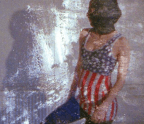Thinking in Images

“I am forever indebted to cinema,” wrote singer-songwriter Scott Walker in 2007. “It’s always been there for me in all manner of ways. I would not have lived my life here in Europe without it. Now and then I’ve found myself wandering in dark towns or cities rather like those depicted by Kaurismäki. Have turned a corner and there was salvation looming before me in the form of a movie house. They all seemed to have a late-night screening of The Third Man (1949), but what could be better?”
Walker (née Noel Scott Engel), who passed away from cancer this March at age 76, was a unique figure in the field of pop music. Having risen to early fame as one-third of The Walker Brothers (none of them brothers, and none named Walker), he soon found himself worn out by the pressures of superstardom and unsatisfied by the artistic restrictions of his proto-boy band. Embarking on a solo career as a Jacques Brel-worshipping existentialist crooner, he released four cultishly revered albums between 1967 and 1969 (all of them titled simply with his name and a numeral) that combined an iconoclastic lyrical approach with sophisticated musical arrangements. Scott to Scott 4 formed the basis of Walker’s legendary status as a musician’s musician, one who left his imprint on generations of renowned colleagues: from David Bowie and Brian Eno to Marc Almond and Julian Cope (whose modestly subtitled 1981 compilation Fire Escape in the Sky: The Godlike Genius of Scott Walker was crucial for re-establishing Walker’s credibility at a time when his solo albums were out of print and a decade of compromises had tarnished his reputation and self-esteem); from Nick Cave and Johnny Marr to Jarvis Cocker (who got Walker to produce Pulp’s last studio album, 2001’s We Love Life) and Radiohead’s Thom Yorke, among many others.
But for all his musical prowess, Walker felt closer to another art. His “first love” was the movies, and the singer-composer remained a (1983) offered a trance-like, fragmented sonic experience largely devoid of conventional melody (and completely devoid of commercial sense: half of the album’s songs are untitled). The result was a critical hit but another commercial flop: allegedly, it was the worst-selling album in the history of Virgin Records.
You’re reading a preview, subscribe to read more.
Start your free 30 days





